Taylor Swift Doesn't Need Our Approval Anymore
'The Life of a Showgirl' is her most unbothered album yet—and that's exactly what's bothering people.
My initial reaction to my first listen of Taylor Swift’s The Life of a Showgirl was that it was filled with fun, catchy songs, but none gave me chills the way some of the tracks on her last few albums have done. On my seventh listen, though, I couldn’t stop singing along to earwormy songs like The Fate of Ophelia and, yes, even Wood.
Of course, the internet has found itself in a tizzy this past week over this album. Is it good? Is it bad? Did Taylor set fans up for disappointment? Have her writing abilities gone down the toilet? I’ve read many takes on the album (perhaps too many), and wanted to break down a few key points I keep hearing, if only to clarify my own thoughts about where I stand on the album and its mixed reception.
First things first, what, in essence, is rubbing people the wrong way about The Life of a Showgirl? From my own initial reaction to reading the online discourse, it’s the cockiness and the swagger coursing through this album. This is new for Taylor Swift fans and non-fans alike. What people want and love most from Taylor Swift is the insecurity, the vulnerability, and the angst. This is what listeners tend to relate to and cling to, as humans and especially as girls who’ve grown up alongside her. We, in essence, are looking for relatability. There’s a reason why All Too Well is one of Taylor’s most beloved songs: it captures the heartbreak of remembering a lost love so well.
Yes, there are also the arguments about the music itself (it’s lazy, it’s bad, it’s nothing special) and the writing (the modern-day slang is cringe, the overtly sexual references feel clunky and awkward), but I’ll address these later. What I want to focus on is the emotional reaction to the messaging in the songs.
The Life of a Showgirl veers sharply from the direction that Taylor Swift’s brand has established thus far: music that comes from a place of insecurity, vulnerability, and deep relatability. In this new record, Taylor confidently embraces her extraordinary status rather than clinging to an underdog mindset, and this shift is uncomfortable for some. Her writing on The Life of a Showgirl is self-assured, entirely nonplussed, full of swagger. She’s having fun with this newfound confidence—no doubt in part stemming from her record-breaking Eras tour that catapulted her into billionaire status and her highly public engagement to an NFL star. (I’m careful not to lump “happiness” or “love” in with “confidence” here; Taylor has been happily in love before. See: “Gorgeous,” “King Of My Heart,” etc.).
Where I land on the album is this: Now that Taylor Swift is in a place of total security (mega popstardom, billionaire, engaged to Killa Trav), she’s writing songs like it. Is that wrong? As a longtime fan, I don’t think it’s producing her best music lyrically. I gravitate towards her more wistful, angst-laden songs (why I believe “Ruin The Friendship” is a standout track in terms of storytelling on this album that gives us a taste of that nostalgic Taylor). But to disregard the album entirely because the story itself isn’t sitting right or because some of the writing is clunky—or outright cringey—does the music as a whole a disservice.
The music in The Life of a Showgirl is solid. Max Martin and Shellback delivered what they were hired to deliver: earworms and pop bangers. “Opalite” and, perhaps regrettably, “Wood,” will be played on many a wedding dance floor for years to come. “Honey” is a classic Taylor track that evokes “Gorgeous” vibes; the more I listen to this song, the more I appreciate the production and the writing. Aside from the production, the vocals on this album are some of the most precise and evocative I’ve heard from Taylor. The way she croons “actually sweet” and “honestly wild” in a seductive manner in “Actually Romantic”; the octave switches in “Wi$h Li$t” and, of course, her signature harmonies. The music and production sounds wildly different from her last few albums; this was intentional.
* * *
Critics are saying that Taylor Swift simply can’t shrug off the underdog and victim mindset.1 My response is: Have you actually listened to this album? There is nothing underdog about it. Taylor Swift knows she’s on top, and she’s telling us it’s a blessed and cursed place to be. Discussing the burden of fame is not equivalent to claiming that one is an underdog. See: “Father Figure,” “CANCELLED!,” “Actually Romantic.” For perhaps the first time in her career, Taylor Swift is sharing that she’s unbothered by her haters. You could argue that writing these songs proves that she is bothered by her haters, but again, I urge you to go back and read the lyrics. Let’s look at “Father Figure,” for instance.
“Father Figure” is a (perhaps literally) dick-swinging track about a mob-boss-esque exec who can make dreams come true and demands loyalty in return from his acolytes. In this scenario, Taylor herself is the “Father Figure,” yet she’s also been on the other, more vulnerable side of the table (presumably referencing her relationship with Scott Borchetta). This track, while definitely cocky, reveals a self-awareness: that the father figure is, in most cases, both villain and benevolent patron.
Taylor is well acquainted with the villain role; her now-deteriorated relationship with protégé Olivia Rodrigo is perhaps the most public example. Olivia’s tracks on her debut album, deja vu and 1 step forward, 3 steps back, now bear Taylor Swift and Jack Antonoff’s names on the songs’ writing credits after a semi-public feud between the two artists. In “Father Figure,” Taylor Swift is saying I’m the shit while also acknowledging that this position can be a dark one that doles out love for “pure profit.” That’s very different from simply saying I’m the shit and you owe me everything. It’s bombast mixed with a bit of dark self-awareness.
Wherever you may stand on “Actually Romantic” — is it punching down? — the song is not about her alleged victimhood; it’s about using her status and power to humiliate a fellow pop star. Despite its problematic implications, “Cancelled!” is a song that suggests Taylor Swift is no longer playing a victim or an underdog; she’s welcoming the attacks with open arms. Only a person at the top of their game, untouchable, could write a song as wildly bold as “Cancelled!”
* * *
But Taylor’s confidence doesn’t mean she’s delusional about her circumstances.
In “Wi$h Li$t,” she openly dreams of her future: a simple life with Travis Kelce, kids, a “driveway with a basketball hoop”.
This dream of a simple, settled-down life has rubbed people the wrong way. The argument goes that this is false; Taylor Swift does not want normalcy, she wants to be extraordinarily rich and successful. She owns more than one private jet, multiple multi-million dollar homes, Gucci. Wishing for a simple life in the suburbs is not only laughably disingenuous coming from someone like Taylor, but it’s physically impossible for a wealthy celebrity who ostensibly must hire security at all times.
I’d argue that Taylor Swift’s aim in “Wi$h Li$t” isn’t to convey a disingenuous wish for normalcy—it’s to share tragic awareness about her situation. See this line in the song:
“We tell the world to leave us the fuck alone / And they do, wow.”
My read of that “wow” line (and the way she sings it: sarcastic disbelief) is that Taylor Swift knows this dream is ludicrous. She understands she’s living the life of a showgirl; normalcy is no longer an option. She is “married to the hustle” as she shares in the title track, but that won’t stop her from wishing. This, to me, makes “Wi$h Li$t” both a love song and a tragic one. Whether your reaction is “poor Taylor” or “poor little rich girl Taylor” is up to you. Either reading is fair IMO; that’s what art is about - the interpretations will differ based on the consumer of the art. In our current eat-the-rich environment, I can see how the latter view is more popular.
* * *
Is Taylor just in it for the money? Is her art suffering because she’s optimizing for sales?2 The argument makes logical sense. When a company solely optimizes for sales, it’ll do anything to get there to the detriment of the work, its employees, and its customers. But…we’ve all known that Taylor Swift is in it for the money and the art. She’s a fantastic businesswoman, and she cares a whole damn lot about receiving Grammys and five-star reviews.
The fact that Taylor Swift wants to make money doesn’t bother me. She’s not pulling the wool over any fans’ eyes. The fans who buy her myriad limited-edition vinyls do so knowing exactly what they’re getting, and they do so enthusiastically. The same thing goes for her release party movie: I paid $12 and got exactly what I expected (which was not a lot): a music video debut and explainers about the tracks on The Life of a Showgirl. I bought the ticket because I was excited and wanted to be with fellow fans.
And about the art itself: art is subjective. Some people hate this album. Others love this album! I sit somewhere in the middle. Whether the art itself is good or not is a moot point when talking about an artist’s motivations. I take most issue with the notion that the primary motive in releasing an album like The Life of a Showgirl is a ploy for making a quick buck. Taylor Swift isn’t going to put out bad music because she knows she’ll make millions. She puts music out when she feels it’s good enough. Does she need more people on her team to tell her to slow down, provide critical feedback, and encourage her to take a moment? Yes, probably! Based on what I saw in the release movie, she is surrounded by people who are only saying yes to her.
Taylor Swift’s commercial goals don’t negate her artistic intent. Taylor’s main goal with this album, which she explicitly shared in the messaging leading up to its release, was not to create her most artful album. It was to produce another hit pop record with two producers who have done that with her in the past. Pop music is by definition the median. It’s crowd-pleasing music. It’s commercial. It makes lots of money. It’s not meant to be groundbreaking or experimental. Some may find that boring, and that’s fine! But to say that Taylor Swift can no longer create anything original is an unfair reading of this album and Taylor Swift as a songwriter and entertainer. She set a clear goal, and she exceeded it (at least, by sales records). The question of whether commercial success equals artistic success is one each listener must answer for themselves.
* * *
The musical and lyrical shift in The Life of a Showgirl — and the intense reaction to it — makes sense when you consider what critics have always said about Taylor’s appeal: that her deep relatability, particularly to girls, a swath of the population often ignored by the music industry, has always been the key to her success.
This Atlantic article summarizes professor Stephanie Burt’s thesis from her book about Taylor Swift, that her
“extraordinary success stems from how ordinary she seems—a consensus that both underplays her achievement and insulates her from critique.”
The Life of a Showgirl shows us that Taylor Swift has escaped from this insulation for now. She’s self-assured and successful enough to say, actually, you know what? I am extraordinary. I’ve achieved this much. I’ve got the man I’ve always wanted. “Girls, I don’t need to catch the bouquet / To know a hard rock is on the way.” Is it annoying? I guess, if your expectation is for Taylor Swift—a billionaire, mega-successful pop star—to be highly relatable.
I don’t expect relatability from all of Taylor Swift’s music, but I know many do, perhaps out of nostalgia for her older music, which explored the inner lives of girls so well. We (specifically, millennial women), in a way, grew up emotionally with her.
Part of the shift in Taylor Swift’s music on The Life of a Showgirl is a result of growing up out of girlhood and into womanhood. At 35, she’s in a much different place from when she wrote Teardrops on My Guitar as a teenager in Nashville. That, I can relate to.
Whether Taylor can continue to connect with universal emotions from her rarefied position remains to be seen. But that’s a question for her next album—not a flaw in this one.
* * *
Taylor Swift knows the critics will latch onto and dislike the new, cocky attitude that The Life of a Showgirl showcases. It’s too bad she doesn’t need their approval anymore. This album is the equivalent of the shrug emoji transitioning to the red dress dancer emoji, bounding away happily and obliviously into the sunset. Some will be happy for her, and some will be positively annoyed.
The question isn’t whether Taylor Swift can move beyond the underdog narrative. The Life of a Showgirl proves she already has. The question is whether her audience can move on with her in her new strata of existence.
*
Please be respectful in the comments; dialogue is encouraged.
From The New Yorker’s Amanda Petrusich: “Swift has been slow to abandon the underdog mentality she developed as an upstart. What she does for a living is surely gruelling, but relentlessly pointing out how fame is poisonous and burdensome isn’t exactly revelatory.”
This is in response to the article “No Good Art Comes From Greed” in Defector.




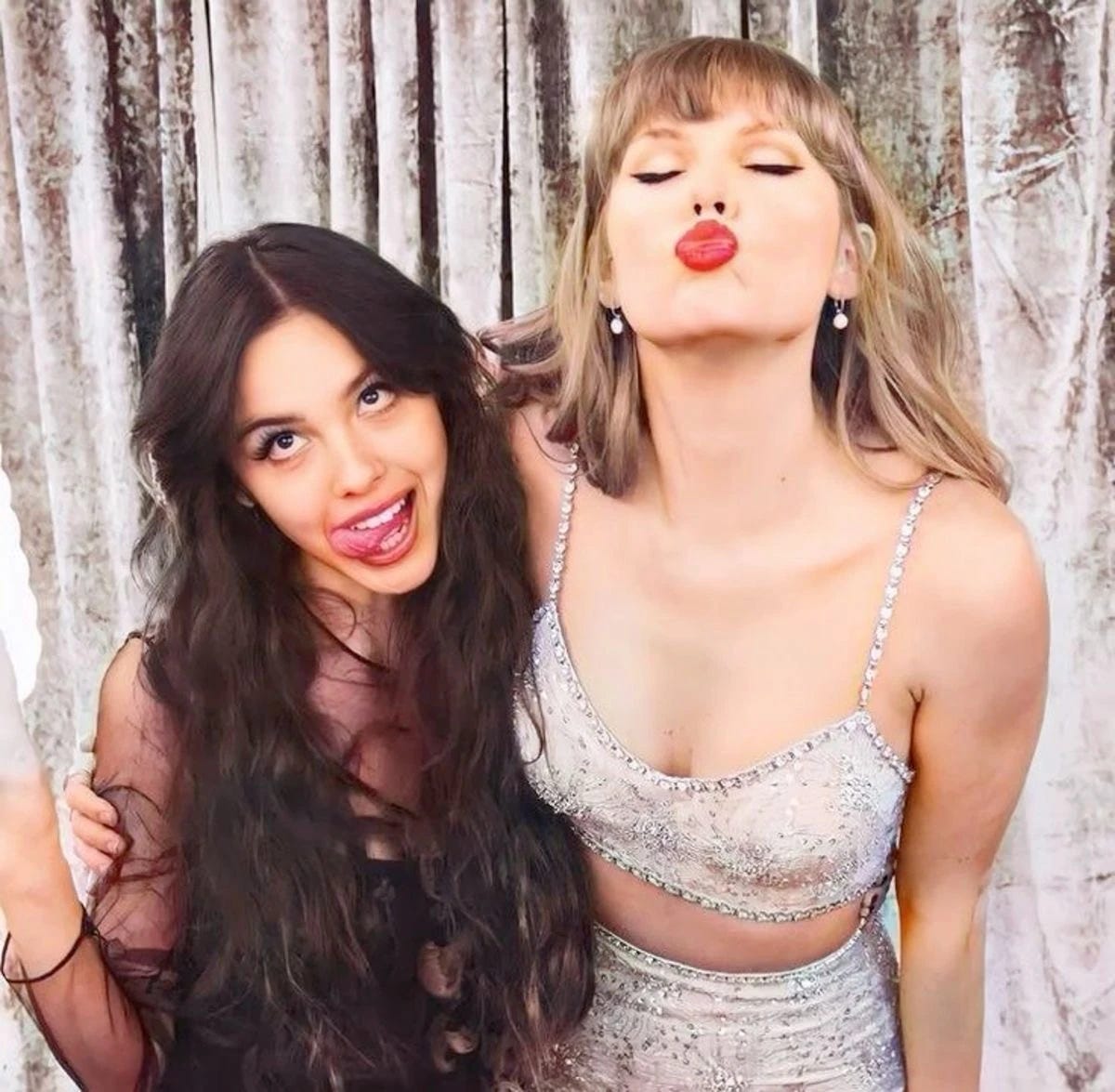
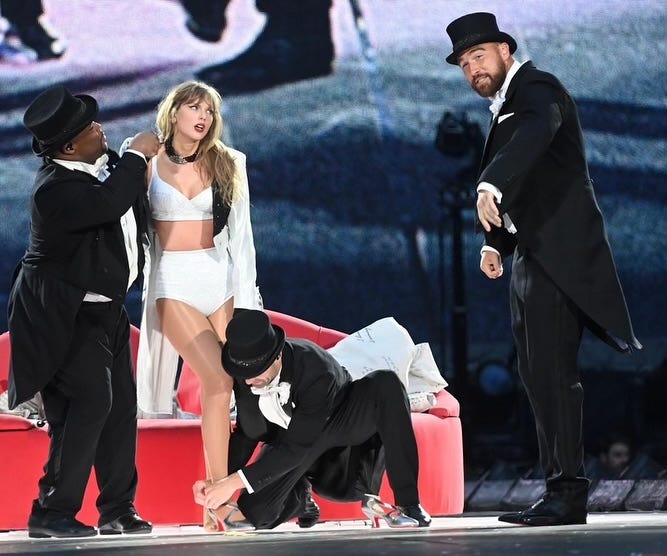
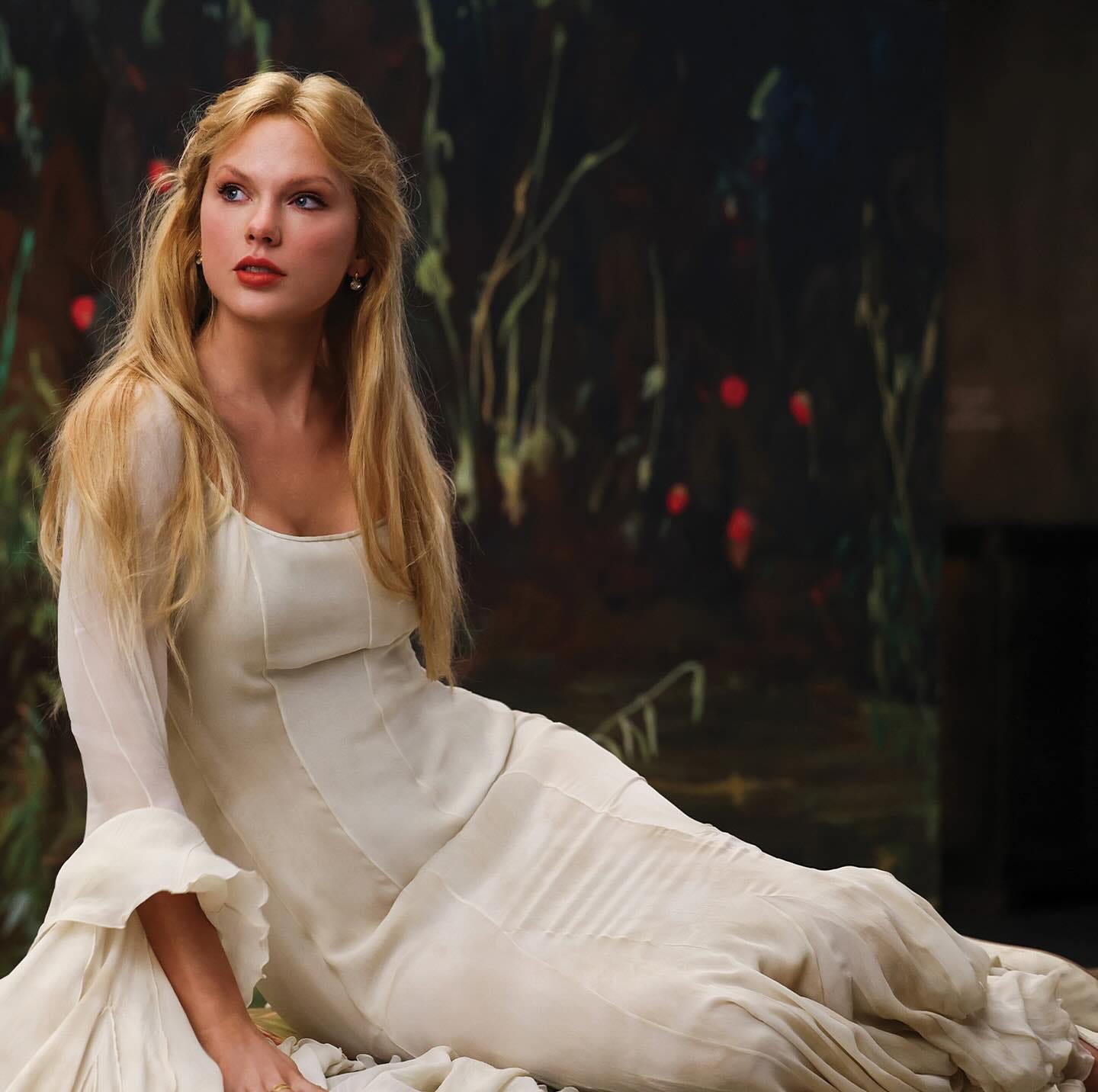
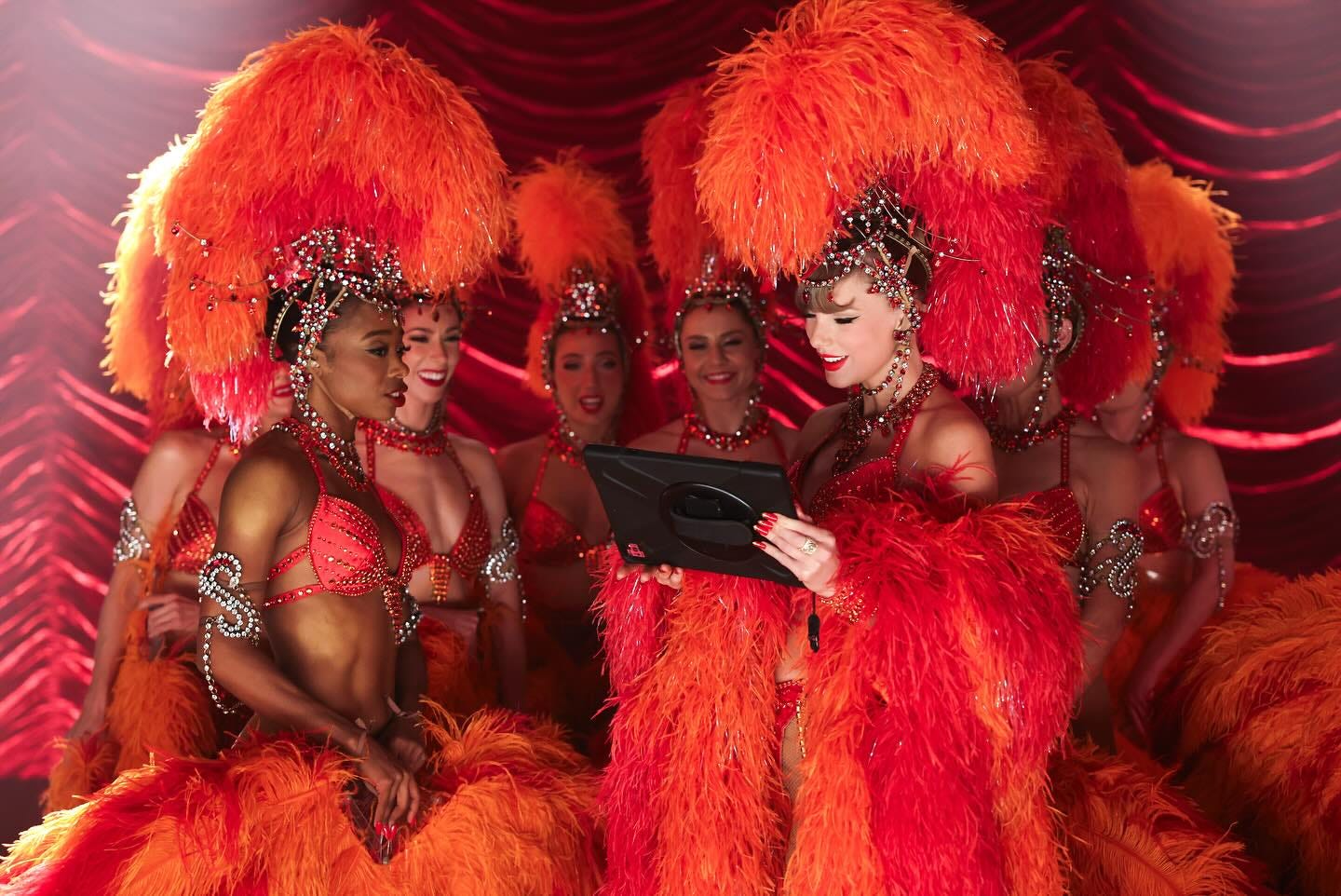
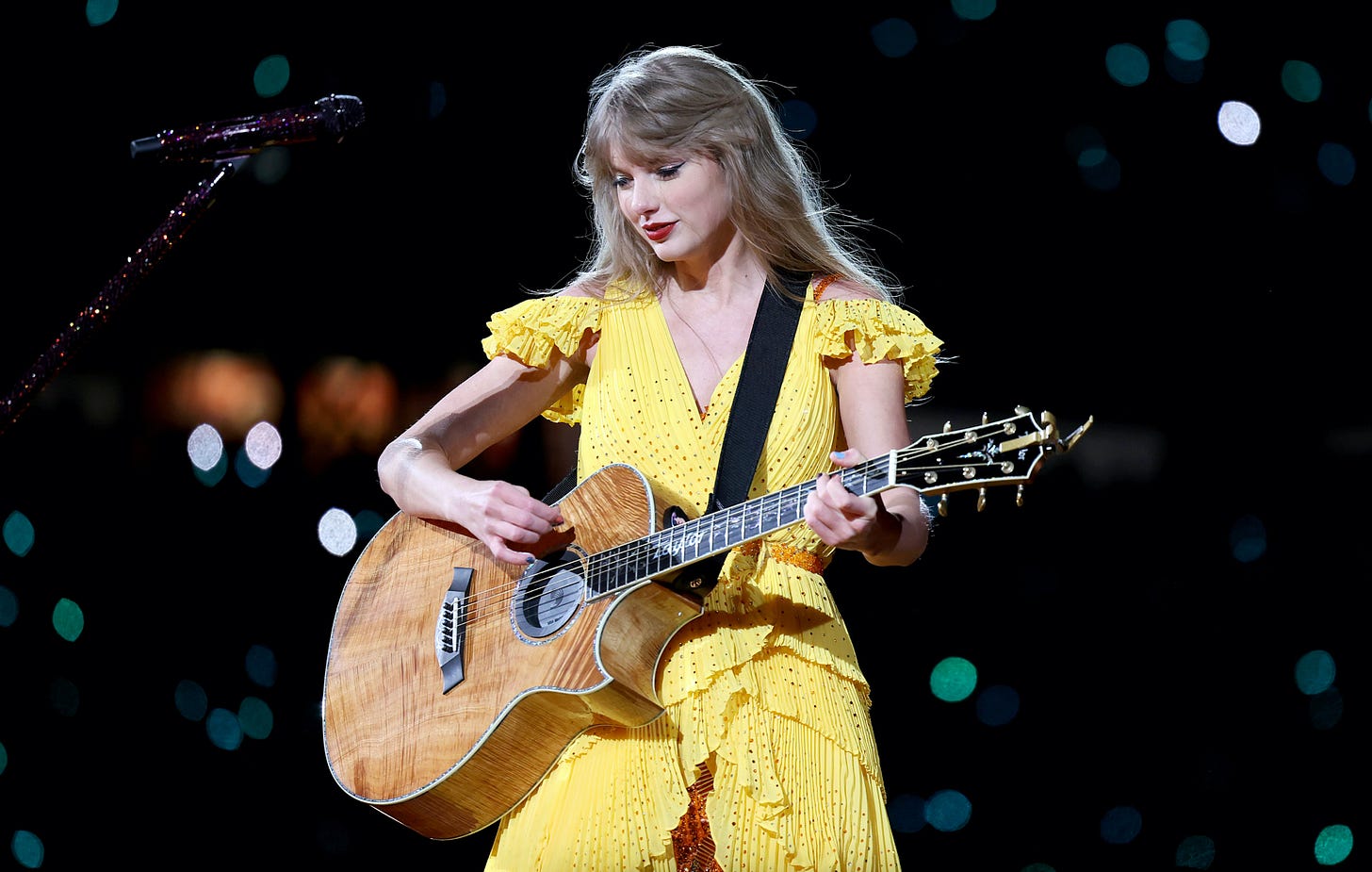
What’s your take on the micro (macro) aggressions against Black women in several TLOAS lyrics? And on Cancelled! seemingly aware of her associations with MAGA supporters?
My issue with the album isn’t that she comes across as confident; it’s that I’m genuinely concerned by how Taylor is using her brand of white feminism to push harmful ideas, and how diehard fans continue to defend it. There’s nothing wrong with calling out our faves when we see something problematic. I wish you’d touched on these points in your article, since they’re a big part of why so many people (myself included) are taking issue with this album.
Ooh I find that linked Defector piece from Kelsey McKinney so apt, especially this line:
"Good creative work draws on the well of your experience, on everything that you consumed and felt and saw over a period of time. If you dip into the well constantly without giving it time to refill, you end up with nothing but pieces of mud, nothing that will satiate a thirst for art."